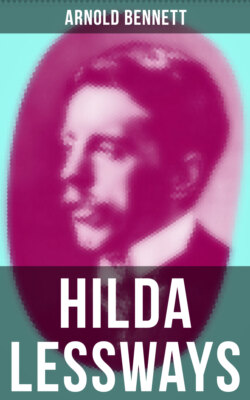Читать книгу HILDA LESSWAYS - Arnold Bennett - Страница 33
На сайте Литреса книга снята с продажи.
iv
ОглавлениеArthur Dayson and his proof-correcting lost all interest and all importance for Hilda as Mr. Cannon came into the room. The unconscious, expressive gesture, scornful and abrupt, with which she neglected them might have been terribly wounding to a young man more sensitive than Dayson. But Dayson, in his self-sufficient, good-natured mediocrity, had the hide of an alligator. He even judged her movement quite natural, for he was a flunkey born. Hilda gazed at her master with anxiety as he deposited his black walking-stick in the corner behind the door and loosed his white muffler and large overcoat (which Dayson called an ‘immensikoff.’) She thought the master looked tired and worried. Supposing he fell ill at this supreme juncture! The whole enterprise would be scotched, and not forty Daysons could keep it going! The master was doing too much—law by day and journalism by night. They were perhaps all doing too much, but the others did not matter. Nevertheless, Mr. Cannon advanced to the table buoyant and faintly smiling, straightening his shoulders back, proudly proving to himself and to them that his individual force was inexhaustible. That straightening of the shoulders always affected Hilda as something wistful, as almost pathetic in its confident boyishness. It made her feel maternal and say to herself (but not in words) with a sort of maternal superiority: “How brave he is, poor thing!” Yes, in her heart she would apply the epithet ‘poor thing’ to this grand creature whose superiority she acknowledged with more fervour than anybody. As for the undaunted straightening of the shoulders, she adopted it, and after a time it grew to be a characteristic gesture with her.
“Well?” Mr. Cannon greeted them.
“Well,” said Arthur Dayson, with a factitious air of treating him as an equal, “I’ve been round to Bennions and made it clear to him that if he can’t guarantee to run off a maximum of two thousand of an eight-page sheet we shall have to try Clayhanger at Bursley, even if it’s the last minute.”
“What did he say?”
“Grunted.”
“I shall risk two thousand, any way.”
“Paper delivered, governor?” Dayson asked in a low voice, leering pawkily, as though to indicate that he was a man who could be trusted to think of everything.
“Will be tomorrow, I think,” said Mr. Cannon. “Got that letter ready, Miss Lessways?”
Hilda sprang into life.
“Yes,” she said, handing it diffidently. “But if you’d like me to do it again—you see it’s—”
“Plethora of H2O,” Dayson put in, indulgent.
“Oh no!” Mr. Cannon decided. Having read the letter, he gave it to Dayson. “It doesn’t matter, but you ought to have signed it before it was copied in the letter-book.”
“Gemini! Miss!” murmured Dayson, glancing at Hilda with uplifted brows.
The fact was that both of them had forgotten this formality. Dayson took a pen, and after describing a few flourishes in the air, about a quarter of an inch above the level of the paper, he magnificently signed: “Dayson & Co.” Such was the title of the proprietorship. Just as Karkeek was Mr. Cannon’s dummy in the law, so was Dayson in the newspaper business. But whereas Karkeek was privately ashamed, Dayson was proud of his rôle, which gave him the illusion of power and glory.
“Just take this down, will you?” said Mr. Cannon.
Hilda grasped at her notebook and seized a pencil, and then held herself tense to receive the message, staring downwards at the blank page. Dayson lolled in his chair, throwing his head back. He knew that the presence of himself, the great shorthand expert, made Hilda nervous when she had to write from dictation; and this flattered his simple vanity. Hilda hated and condemned her nervousness, but she could not conquer it.
Mr. Cannon, standing over the table, pushed his hat away from his broad, shining forehead, and then, meditative, absently lifted higher his carefully tended hand and lowered the singing gas-jet, only to raise it again.
“Mr. Ezra Brunt. Dear Sir, Re advertisement. With reference to your letter replying to ours in which you inquire as to the circulation of the above newspaper, we beg to state that it is our intention to print four thousand of—”
“Two thousand,” Hilda interrupted confidently.
Unruffled, Mr. Cannon went on politely: “No—four thousand of the first number. Our representative would be pleased to call upon you by appointment. Respectfully yours.—You might sign that, Dayson, and get it off to-night. Is Sowter here?”
For answer, Dayson jerked his head towards an inner door. Sowter was the old clerk who had first received Hilda into the offices of Mr. Q. Karkeek. He was earning a little extra money by clerical work at nights in connection with the advertisement department of the new organ.
Mr. Cannon marched to the inner door and opened it. Then he turned and called:
“Dayson—a moment.”
“Certainly,” said Dayson, jumping up. He planted his hat doggishly at the back of his head, stuck his hands into his pockets, and swaggered after his employer.
The inner door closed on the three men. Hilda, staring at the notebook, blushing and nibbling at the pencil, was left alone under the gas. She could feel her heart beating violently.
